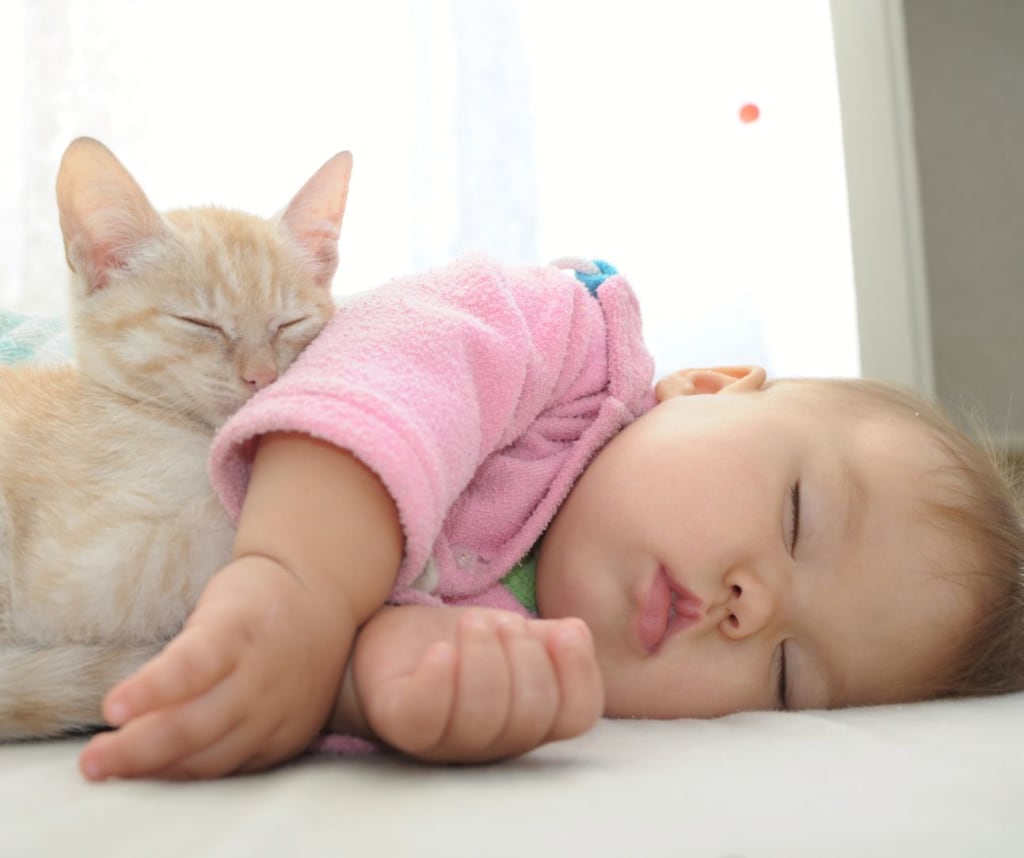Myths About Cats and Babies
And how to keep your baby safe around your cats.

I recently wrote an article about why cats are better than babies. If you haven't had a chance to read it, you can check it out right here.
However, the truth is that most people will have children, even with their beloved furbabies! Most people won't choose between having one, they will happily start a family with their pets by their side.
That being said, there are some myths that you may have heard about cats and babies.
Cats steal the breath of babies. I have no idea where this came from. It sounds silly, but the truth is that many parents believed this myth for many years!
That being said, cats can smother your babies, so it is important that you always supervise your baby when your cat is around.
In fact, many believe that cats can harm unborn babies. Though this sounds silly, there is some truth to this myth. Cats can spread toxoplasmosis through their feces, which can be harmful for pregnant women. For this reason, they shouldn't be handling the feces of cats while they are pregnant. Instead of getting rid of the cat, the father can scoop out the litter boxes for nine months!
So, what can you do to prevent injury from your cat?
You should always supervise your cat when he or she is around your baby. Your cat may enjoy cuddling up to your baby, but this could lead to accidental suffocation.
You should close the door of your baby's room when he or she is sleeping. If you are like most parents, you try to make the most of your baby's naps. Since you don't want to have to worry about whether or not your cat is climbing in the crib with your new baby, you should just close the door for peace of mind.
It is also a good idea to give your cat safe places to sleep. Parents (and any other cat owners) need to make sure that their cats have a way to get away from babies, children, and even themselves.
Crates, pet igloos, cat trees, and other climbing toys can allow cats to get away when they need to be by themselves. Instead of scratching your baby (or even you), they can get away and be left alone!
To prevent toxoplasmosis, pregnant women shouldn't handle cat litter or feces. Another person in the family can scoop out the litter box for a few months. If that isn't possible, make sure that you wear gloves when handling litter.
However, you also need to worry about babies. It is important that they can't get near the litter boxes, especially when they start crawling and exploring. The first thing babies do is put things in their mouths, so it is very important that you make sure that they can't get near your cat's feces.
You can also prevent this disease by keeping your cat indoors and away from other cats. This disease can be spread in the wild, so you are going to want to make sure that your cat stays at home by himself or herself.
They can also get toxoplasmosis by eating raw meat, so it is important that you feed your cat a formulated diet. Not only is this healthier for your cat, but it will make sure that he or she doesn't get toxoplasmosis and spread it to you and your family.
Though people used to think that cats could steal a baby's breath away and hurt them, the truth is that cats and babies can get along great, as long as you supervise them. You should never allow your cat to be alone with your baby, because they could accidentally suffocate them. For this reason, you need to make sure that you close the door when your baby is napping.
You also need to think about toxoplasmosis. This disease can hurt an unborn baby and a newborn one too! For this reason, you need to ask someone else to handle the litter box when you are pregnant. If that isn't possible, use gloves. Then, when your baby is older, make sure that you keep him or her away from the litter box!
***
Previously published on Medium and/or Newsbreak.
About the Creator
Shelley Wenger
Small town country girl in southern Pennsylvania. Raising two boys on a small farm filled with horses, goats, chickens, rabbits, ducks, dogs, and a cat. Certified veterinary technician and writer at Virtually Shelley.






Comments
There are no comments for this story
Be the first to respond and start the conversation.